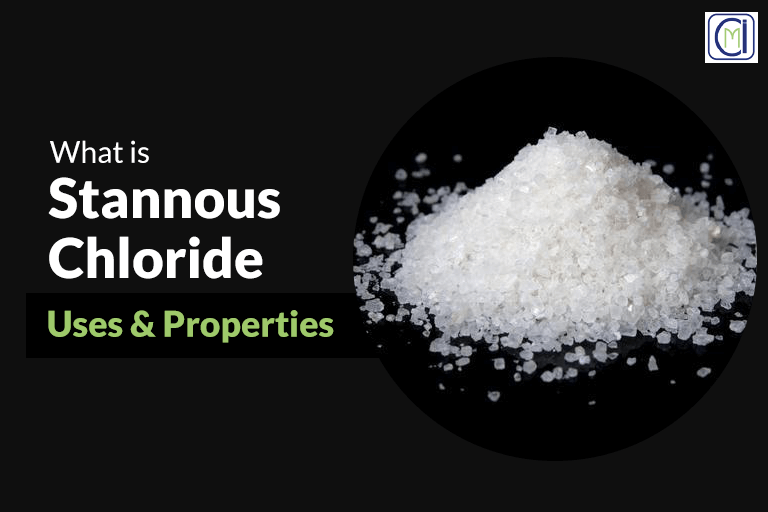
What is Stannous Chloride? Its Uses & Properties?
What is Stannous Chloride?
Stannous Chloride is popularly known as Tin Chloride. The chemical formula is SnCl2. It contains a lone pair of electrons, making the molecule bent in the gaseous phase. In the solid-state, Stannous Chloride appears in crystalline form. It actively reacts with alcohols, oxidizers, and amines.
Preparation:
Dry hydrogen Chloride is brought in contact with tin metal to prepare anhydrous, Stannous Chloride. Similarly, Tin is made to react with Hydrochloric acid to produce dehydrate. The product of this reaction contains water which is carefully evaporated from the solution to give SnCl2.2H20. This can be converted into anhydrous, Stannous Chloride using acetic anhydride.
Properties:
- The Molecular weight of Tin Chloride is 189.60 g/mol
- The density of Tin Chloride is 3.95 g/cm3
- The Boling point of Stannous Chloride is 623 degrees Celsius.
- The melting point is 247 degrees Celsius
- It is a powerful reducing agent since it absorbs Oxygen from the air.
- Stannous Chloride acts as lewis acid where it forms complexes with Chloride ions and other ligands.
Uses:
- Stannous Chloride is actively used in Tin plating, where it is used with Hydrochloric acid . However, it is mainly used in the steel industry to make tin cans.
- In the textile industry, it is used as mordant in the dyeing process to impart brighter colors to the textile. It is also used as mordant in silk to increase its weight solely.
- Stannous Chloride is now being used in toothpaste for its effectiveness against enamel erosion.
- It acts as a catalyst in the production process of plastic polylactic acid.
- Stannous Chloride is also used in the metal industry as a reducing agent where it reduces the salts of gold and silver to the metal itself.
- In the chemical processes, it is used as a source of Sn2+ to form different tin compounds.
- In the food industry, Stannous Chloride is used as a food additive to enhance the flavor and overall presentation of the food product. It is also a part of many bottled and canned food products as a color retention agent. It is also used for its anti-oxidation properties
- It is used in manufacturing a range of pharmaceutical products.
- In the medical sector, it is used in radionuclide angiography, where it is used to reduce technetium -99m-pertechnetate, the radioactive agent. This reduction helps it to bind with the blood cells.
Are There Any Health Hazards?
Direct exposure to the Stannous Chloride can be hazardous to human health. Any contact with the skin or respiratory system can lead to severe injuries and death. It is known to cause burns to the skin and eyes when exposed to the human body in its molten form. Stannous Chloride should be subjected to heating in the prescribed environment as it releases toxic gases and can be irritating.
Conclusion
Stannous Chloride has many uses in different industries and domains. Refined quality Stannous Chloride can be used to get the best results from it. You can connect with us for all your needs related to Stannous Chloride. We are one of India's leading Stannous Chloride manufacturers with a long list of clients. We have made a mark in the industry as a Stannous Chloride supplier with quality products. We used industry-approved methods and procedures to manufacture the best quality Stannous Chloride. Our experts use globally-approved testing procedures to check the authenticity of the product. We maintain a temperature-controlled environment for the storage of Stannous Chloride. Contact us today to get the desired amount of quality Stannous Chloride at affordable rates.
Frequently Asked Questions About Stannous Chloride:
Tin(II) chloride, also known as stannous chloride, is a white crystalline solid with the formula SnCl 2. It is widely used as a reducing agent (in acid solution), and in electrolytic baths for tin-plating.
Stannous fluoride is a naturally occurring mineral that can: help reduce cavities. prevent tooth sensitivity.
Tin (II) chloride, dihydrate, not to be confused with Tin (II) chloride, anhydrous, is created through dissolving tin in hydrochloric acid.
